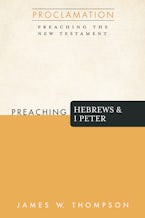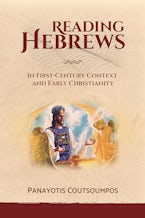Was Hebrews originally written in Hebrew?
Tuesday, November 30, 2021
Saturday, November 27, 2021
Dyer Reviews Costley, Creation and Christ
Bryan R. Dyer reviews Angela Costley, Creation and Christ: An Exploration of the Topic of Creation in the Epistle to the Hebrews.
Friday, November 26, 2021
Thursday, November 25, 2021
Two New Books with Wipf and Stock
I noticed two new books on Hebrews on the Wipf & Stock website:
James W. Thompson. Preaching Hebrews and 1 Peter. Proclamation: Preaching the New Testament.
"Because commentaries are increasingly complex, preachers face the challenge of mastering the results of critical scholarship and merging the horizons between exegesis and a living word for the congregation. In this volume, Thompson offers a guide for preachers, using the results of current scholarship on Hebrews and 1 Peter to enrich the preaching task. He demonstrates that these ancient letters, which speak to believers whose faith has made them aliens and exiles in their own land, offer insights that speak to believers who are aliens and exiles in a post-Christian culture. While the standard commentaries analyze the historical and grammatical issues in detail, this book demonstrates the focus and rhetorical effect of each section, making it accessible for preaching. He focuses on the argument of each letter and its pastoral dimension for the ancient and contemporary audience. Thompson also demonstrates the path from exegetical insight to the focus and function of each pericope for the sermon. Brief sermon sketches demonstrate the relationship between the focus of the text and the focus of the sermon."

Panayotis Coutsoumpos. Reading Hebrews in First-Century Context and Christianity.
"Paul's epistle to the Hebrews is one of the most detached and polemical letters in the whole Bible, making it one of the most difficult documents to study. In the letter to the Hebrews, we find the basic concept of the author's theology on the topics of the sanctuary and the high priest in the temple. What made Hebrews a special letter is a sermon and refined oral style. Another feature of Hebrews is its originality and Paul's use of the Old Testament. The Christology in Hebrews focuses on Christ's preexistence and divine status, as well as the humility that makes him our example. Hebrews portrays Jesus as ultimate high priest, who sacrificed himself once for all to atone for human sins."

Thursday, November 11, 2021
Hebrews at the Annual Meeting of the Society of Biblical Literature
Institute for Biblical Research
3:30 PM–5:30 PM
Marriott Rivercenter - Salon B
Theme: Research Group - Hebrews and the Pauline Tradition
This research group explores the relationship between Hebrews and the Pauline tradition. While Hebrews must be able to speak on its own terms, historical and canonical imperatives call for it to be read alongside Paul’s letters. This year, we invited papers that engaged with specific texts or themes in Hebrews and the Pauline Epistles.
For more information, visit the Research Groups tab under the IBR website (www.ibr-bbr.org).
Am I Not an Apostle? Authorship and the Signs of an Apostle (30 min)
Madison N. Pierce, Trinity Evangelical Divinity School
The Roles of Angels in Hebrews and the Pauline Corpus (30 min)
Discipline of the Body (30 min)
Institute for Biblical Research
3:30 PM–5:30 PM
Marriott Rivercenter - Conference Room 6
Theme: Research Group - The Relationship between the Old Testament and the New Testament
This study group explores various themes related to the nature of the relationship between the Old Testament and New Testament and their function as Christian Scripture independently and intertextually. A scholarly approach is applied to both traditional and
trendy views.
which various New Testament writers interpret the Old, and (4) the way in which Christians have understood the unity of the Bible and the continuing relevance of the Old Testament.
For more information, see https://ibr-bbr.org/annual-meeting/researchgroups.
Gareth L. Cockerill, Retired, Wesley Biblical Seminary
Sinai in the Letter to the Hebrews: God Speaks Today (20 min)
Hebrews as a Hermeneutical Lens on the Old Testament (20 min)
Productive Prejudgments in Hebrews’s Hermeneutic: A Method and Test Case (20 min)
Ardel B. Caneday, University of Northwestern - St. Paul
The Exegetical Significance of the Old Testament’s Silence in the Case of Melchizedek’s Ancestry and Progeny in Genesis 14 (20 min)
SBL Hebrews Section
4:00 PM–6:30 PM
San Antonio Convention Center - 217D (Meeting Room Level)
Madison Pierce, Trinity Evangelical Divinity School, Presiding
Union with Christ in Hebrews (30 min)
Hebrews 2:9–13 and the Social Identity of the Children of God (30 min)
Placing Words into Jesus’s Mouth: The Exegetical Methodology of Hebrews 2:10–18 (30 min)
There Remains a Sabbatismos: Divine and Human Rest in Hebrews 3–4 in Light of Early Jewish Sabbath Discourse (30 min)
Not Re-laying an Old Foundation: Neglected Evidence about the Temptation Facing Hebrews’s Audience and the Impossibility of Repentance in Heb 6:1–6 (30 min)
SBL Theological Interpretation of Scripture / Hebrews Section / Theological Interpretation of Scripture Seminar / Hebrews Section
1:00 PM–3:30 PM
Losoya Conference Center - Maverick
Theme: Theological Readings of Hebrews
Amy Peeler, Wheaton College (Illinois), Presiding (5 min)
Bryan Dyer, Baker Publishing Group, Panelist (25 min)
Katherine Sonderegger, Virginia Theological Seminary, Panelist (25 min)
Nicole Reibe, Loyola University Maryland, Panelist (25 min)
Amy Peeler, Wheaton College (Illinois), Respondent (15 min)
Discussion (30 min)
4:00 PM–6:30 PM
Grand Hyatt - Presidio C (3rd Floor)
Julie M. Leyva, Duke University
Someone Has Testified Somewhere: Preaching the Nicene Creed from the Forgotten Book of Hebrews (30 min)
SBL Hebrews Section
4:00 PM–6:30 PM
Hilton Palacio Del Rio - La Condesa (Mezzanine)
Intercessio Tacita: ἔγγυος in Hebrews 7:22 in Light of Ancient Legal Practices and Documentary Papyri (30 min)
Christ Intercedes or Judges? An Examination of the Ethiopian Orthodox Church’s Rendering and Interpretation of ἐντυγχάνω in Romans 8:34 and Hebrews 7:25 (30 min)
Christ’s Body and the Shame-Faced God: Reading Christ’s Session in Hebrews with Melito and Theophylact (30 min)
Christy M. Anderson, Fresh Start Church
Critical Hook Culminating in Hebrews 10:9 Clarifies the Referent as Christ’s Physical Body Sown in Death, Not the Abolishing of an Eternal Covenant (30 min)
Michael Francis, John Brown University
Intentional and Unintentional Sin in Hebrews (30 min)
SBL Jewish Christianity / Christian Judaism Section
9:00 AM–11:30 AM
Virtual - Virtual
Theme: Rethinking the Didache, Didascalia Apostolorum, and Apostolic Constitutions
“Parting of the Prayers”: How Heb 11 and Didache 10 Inform the Development of the Apostolic Constitutions 7.32–33 and the Amidah (Shemoneh Esrei) (25 min)
Discussion (10 min)
Saturday, November 6, 2021
Hebrews Highlight - September 2021
Yes, I know it's late, but I had a couple of links to articles on Hebrews sitting on my desktop that I have just read and think they are important to note:
Jesper Svartik discusses the issue of Hebrews and supercessionism.
He also reflects upon the lectionary passages for October 3 (Hebrews 1:1–4; 2:5–12) and October 10 (Hebrews 4:12–16).
Amy Peeler explains the warning passages in Hebrews.
Friday, November 5, 2021
Long Reviews Osborne's Commentary on Hebrews
Phillip Long reviews Grant R. Osborne and George H. Guthrie's commentary, Hebrews: Verse by Verse. Osborne New Testament Commentaries.





